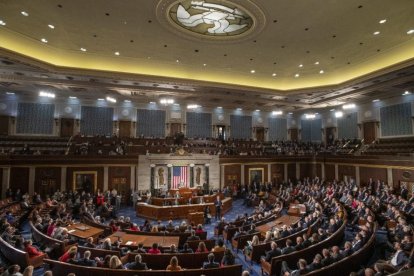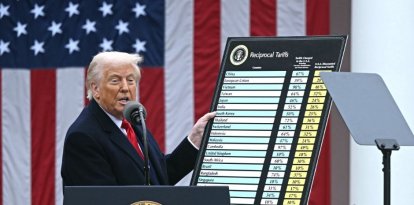Give and take: Record number of Hispanic senators elected, but House loses three Latino representatives
The new legislature goes from five to seven legislators from the Hispanic community in the Senate, while the number of representatives in the House is reduced to 45.

House of Representatives
There were ups and downs for the Hispanic presence on Capitol Hill in the November election. The Senate saw a new record number of Latinos, going from five to seven, though this number could drop to six if Marco Rubio is confirmed as secretary of state. On the other hand, the House of Representatives lost three members from the Hispanic community and now has only 45 Latino representatives.
In the Senate, each party added a new Hispanic legislator. Democrat Ruben Gallego became Arizona's first Hispanic senator after defeating Kari Lake in a close battle for Kyrsten Sinema's vacant seat. The Republicans will add Bernie Moreno, who will also be the first Latino senator from Ohio after defeating incumbent Sherrod Brown.
A new Latino seat for each party in the Senate
The only Hispanic senator whose seat was at stake was Ted Cruz, and he managed to save it more comfortably than the polls predicted. Democrats Alex Padilla (California), Catherine Cortez Masto (Nevada), Ben Ray Luján (New Mexico) and Republican Marco Rubio (Florida) were not up for reelection. Although Republicans control the Senate, among Latinos, it is the Democrats who hold the majority, 4-3.
However, Rubio could drop the number to six if his nomination as secretary of state in the new Trump administration is confirmed, as everything seems to indicate. The seventh seat could be saved if Gov. Ron DeSantis appoints another Hispanic to replace the Cuban-American. It should be recalled that between 2021 and 2024, the Senate had six Latinos, until Bob Menendez was forced to resign and was replaced by George Selmy.
House of Representatives loses three Hispanic seats
The House of Representatives has not reflected the step forward by Hispanic voters, and the number of Latino legislators in this chamber has dropped by three, from 48 to 45. Republicans are the biggest losers, who will hold just nine seats in the House (four less than currently), compared to 36 (one more than currently) for Democrats.
Nevertheless, several Hispanics managed to break barriers and become the first elected representatives of this community in their respective districts. This is the case of Democratic state Sen. Nellie Pou, who won the race for the 9th congressional district in New Jersey. So did her party colleague, state Sen. Emily Randall in Washington. In California, former San Jose Mayor Sam Liccardo (Democrat), will be the first Latino to represent a Northern California district in more than 120 years.
In addition, California Democratic Assemblywoman Luz Rivas won the seat vacated by retiring Democratic Rep. Tony Cardenas. Also in The Golden State, former Democratic Party Rep. Gil Cisneros will return to the Capitol after prevailing in the race to fill the vacancy of fellow Democrat Grace Flores Napolitano.
Among the defeated, Hispanic Rep. Mike Garcia (R) conceded California's 27th congressional district seat to former NASA Chief of Staff George Whitesides (D). In New York's 4th district, Rep. Anthony D'Esposito (R) was defeated by former Hempstead Supervisor Laura Gillen (D). In Oregon's 5th district, Lori Chavez De-Remer (R) lost to state representative Janelle Bynum (D). The fourth seat that eluded a Latino changed parties, but not ethnicities: in Colorado's 8th congressional district, Democratic Rep. Yadira Caraveo was unseated by Republican state Rep. Gabe Evans.
'Latino candidates on both sides of the aisle made history this election cycle'
Although the net change of Hispanics in Congress is -1 after the election, when an all-time record number of legislators could have been won, the CEO of the National Association of Latino Elected and Appointed Officials (NALEO) Education Fund, Arturo Vargas, was very pleased with the final outcome.
"Latinos contested Congressional seats across the country in an unprecedented election in both the U.S. Senate and the U.S. House of Representatives. Although Latino seats in the U.S. House of Representatives declined, Latino candidates on both sides of the aisle made history this election cycle."
RECOMMENDATION






















